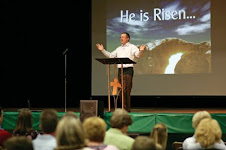Thursday, October 6, 2011
Monday, March 29, 2010
Caiaphas
From Grace, GeorgeThis was a man [Caiaphas (John 18:13-14)] was the guardian of hte nation's soul. He had been set apart to be the supreme interpreter and representative of the Most High. To him was committed the glorious privilege of entering once a year into the Holy of holies. Yet this was the man who condemned the Son of God. History provied no more startling illustration of the truth that the best religous opportunities in the world and the most promising environment will not guarantee a man's salvation or of themselves ennoble the soul. "Then I say," says Bunyan, closing his book [Pilgrim's Progress], "that there was a way to hell even from the gates of heaven.
Saturday, March 27, 2010
Cellular Suffering
Spiritually speaking, if God is not at the center of our souls, then we do not have that which can ultimately meet our thirst and quench it. The real danger of that thirst is eternal death in hell. Hell is the place where we get more and more of what we have been seeking to quench our thirst. Hell is the place where we get more than we ever wanted of of those things that we are trying to stuff into our souls.Jesus tells the remarkable little parable in Luke 16 about a poor man, Lazarus, who is the servant of a wealthy man. Both of htem die within a short period of time; Lazarus goes to heaven, and the rich man goes to hell. From hell the rich man prays to Father Abraham, who is in heaven with Lazarus, "Father Abraham, would you send Lazarus down to dip his finger and give me just a littel taste of water, because it is so hot down here?" (see Luke 16:24).When Jesus says "I am thristy," He is saying, "I am thristy with a thrist that every sinner deserves to experience forever." ...You and I deserve that unquenchable, unremitting, agonizing thrist because we have sought to fill our lives with anything and everything but Him.At the cross, Jesus asks the question, what do you thirst after? Throughout Scripture, thirst is a metaphor for a deep, inward spiritual emptiness and need. Without God we will die, because the Bible says that what we most thirst for and need at the center of our lives is not stuff but God. The question always is, what do I drink to fill that deep and profound thirst within me?If you run out of water, the last thing you want to do is drink salt water. It will only increase your thrist and accelerate the process of dehydration. Every one of us puts our mouth down into salt water of whatever we use to meet our deepest needs. Jesus Christ became for you the One who thirsted unto death. Look to Jesus and say, "You are the only One who can satisfy my deepest need.From Grace, George.
Thursday, March 25, 2010
Silence of the Lamb
Who Is It You Want?
I am the good shepherd. The good shepherd lays down his life for the sheep. They hired hand is not the shepherd who owns the sheep. So when he sees the wolf coming, he abandons the sheep and runs away. Then the wolf attacks the flock and scatters it. The man runs away because he is a hired hand and cares nothing for the sheep.
I am the good shepherd; I know my sheep and my sheep know me - just as the Father knows me and I know the Father - and I lay down my life for the sheep. I have other sheep that are not of this sheep pen. I must bring them in also. They too will listen to my voice, and there shall be one flock and one shepherd. The reason my Father loves me is that I lay down my life - only to take it up again. No one takes it from me, but I lay it down of my own accord. I have authority to lay it down and authority to take it up again.
